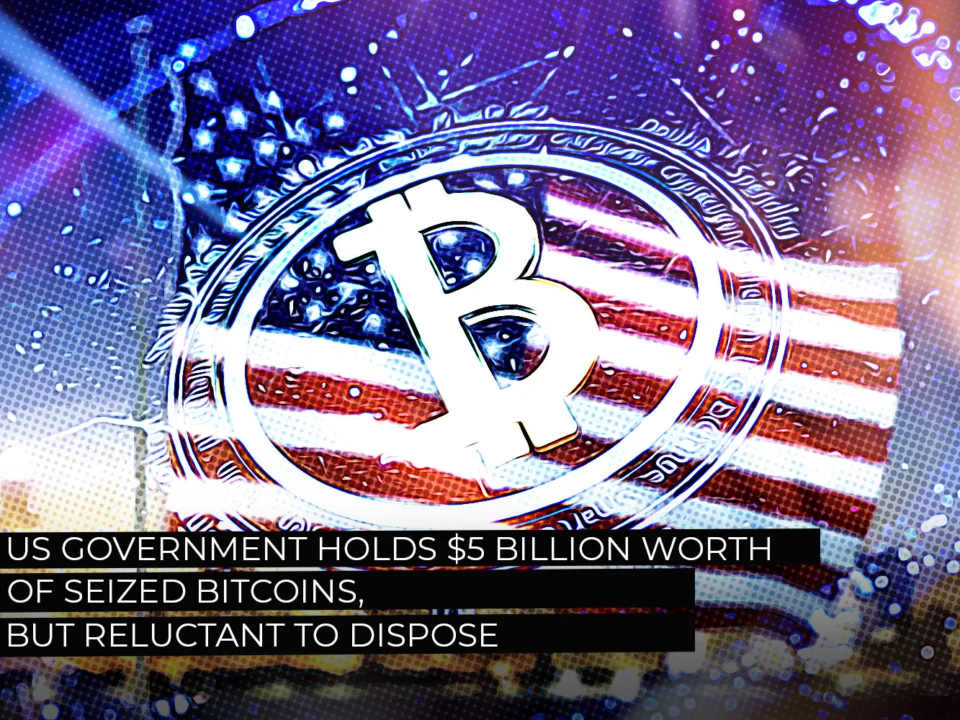The US Government currently holds a staggering $5 billion worth of seized bitcoins, drawing attention from both the crypto community and financial markets. Although these assets represent a significant financial opportunity, the government remains hesitant to sell them. This reluctance raises questions about the underlying reasons and the potential repercussions for the broader economy and cryptocurrency market. Understanding the history and rationale behind these seizures can shed light on the complexities involved in such a substantial asset liquidation.
The History of the US Government’s Bitcoin Seizures

The US Government has a notable history of seizing bitcoins in connection with various criminal activities. These seizures began gaining public attention in the early 2010s and have only increased over time.
Key Events in Bitcoin Seizures by the US Government:
2013: Silk Road Bust
- The government seized about 144,000 bitcoins when they shut down the infamous Silk Road marketplace.
2017: AlphaBay Takedown
- Following the closure of AlphaBay, another notorious darknet marketplace, authorities confiscated thousands of bitcoins.
2020: Bitfinex Hack Recovered Funds
- Part of the funds stolen in the 2016 Bitfinex hack was retrieved, amounting to nearly 69,000 bitcoins.
Seizures’ Significance:
-
Criminal Activity Disruption
- By seizing bitcoins, the US Government significantly disrupts illegal online activities.
-
Record-Keeping and Security
- Seized bitcoins are securely stored in government-controlled wallets, ensuring they are off the criminal market.
Overall, the US Government’s active approach to seizing bitcoins plays a crucial role in mitigating cybercrime. However, this has also led to the accumulation of a substantial amount of digital assets, currently valued at billions of dollars.
Reasons for the Government’s Reluctance to Sell Seized Bitcoins
The US Government holds a significant amount of seized bitcoins, yet it hesitates to liquidate these assets. Several reasons contribute to this reluctance:
Market Impact Concerns: Selling large amounts of bitcoins could destabilize the market. A sudden influx might lead to a drastic price drop, potentially causing economic ripples.
Future Value Speculation: The government may speculate that the value of bitcoin will increase. By holding onto the assets, there is potential for greater returns in the future.
Legal and Regulatory Complexities: Liquidating seized bitcoins involves navigating complex legal and regulatory frameworks. Ensuring compliance with federal laws takes meticulous planning and long processes.
Strategic Reserve: Holding onto these assets provides the US Government with a strategic reserve of cryptocurrencies. This could be used for future law enforcement needs or policy considerations.
Comparison: Market Impact vs Future Value Speculation
| Reason | Description |
|---|---|
| Market Impact Concerns | Fear of causing a market crash due to high volume sales. |
| Future Value Speculation | Holding onto bitcoins in anticipation of rising values and increased future returns. |
In conclusion, the combination of market stability, potential value appreciation, legal hurdles, and strategic planning are key factors behind the US Government’s decision not to dispose of its seized bitcoins.
Potential Impacts of Liquidating the Seized Bitcoins on the Market and Economy
The decision by the US Government to liquidate its seized bitcoins could significantly influence both the market and the broader economy. Here’s a breakdown of the potential impacts:
Market Impact:
- Market Supply Surge: If the US Government decides to sell its $5 billion worth of bitcoins, the sudden increase in supply could drive prices down.
- Market Volatility: The sheer volume of bitcoins entering the market might cause considerable price fluctuations, leading to increased market volatility.
- Investor Sentiment: The decision to liquidate could trigger concerns among investors about government intervention, potentially leading to a short-term sell-off.
Economic Impact:
- Revenue Generation: Liquidating bitcoins could generate substantial revenue for the US Government, offering a potential boost to public finances.
- Economic Stability: A significant influx of government funds could be strategically used to stabilize certain economic sectors or reduce public debt.
- Regulatory Influence: The move could set a precedent for how governments around the world handle seized cryptocurrencies, influencing future regulatory frameworks.
Comparison Table:
| Aspect | Positive Impact | Negative Impact |
|---|---|---|
| Market Supply Surge | N/A | Possible price drop due to oversupply |
| Market Volatility | N/A | Increased price volatility |
| Investor Sentiment | N/A | Short-term sell-offs and reduced market confidence |
| Revenue Generation | Increased public funds | N/A |
| Economic Stability | Potential economic stabilization funds | N/A |
Overall, liquidating such a substantial amount of bitcoins could have both beneficial and adverse consequences, making the US Government’s decision a complex and impactful one.
Frequently Asked Questions
Why does the US government hold $5 billion worth of seized Bitcoins?
The US government has seized this substantial amount of Bitcoins primarily through law enforcement activities targeting illegal operations, such as drug trafficking and cybercrime. When these assets are confiscated as part of criminal investigations, they are held by the government until a legal resolution is reached, ensuring they are no longer used for illicit purposes.
Why is the US government reluctant to dispose of the seized Bitcoins?
The reluctance to dispose of the seized Bitcoins stems from several factors. Primarily, the volatile nature of cryptocurrency markets poses a financial risk during disposal. Additionally, selling large amounts of Bitcoin could potentially affect market stability. There are also ongoing discussions about the best way to responsibly utilize or liquidate these assets for public benefit.
How does the government handle the security of the seized Bitcoins?
The US government employs advanced security measures to manage and protect the seized Bitcoins. These measures include secure wallets, encryption, and multi-signature authentication processes, ensuring that the assets remain safe from hacks or unauthorized access. Dedicated cybersecurity teams are also involved in monitoring and safeguarding these digital assets.
What could the US government potentially do with the seized Bitcoins?
There are several potential avenues the US government could take with the seized Bitcoins. One option is auctioning the assets, as has been done in previous instances, allowing the proceeds to support public programs or law enforcement initiatives. The government might also explore converting the Bitcoins into fiat currency to fund various federal or state projects. Alternatively, holding the Bitcoins as a long-term investment could be considered, given the potential for future value appreciation.

![Reviewing the 5 Best New Meme Coins to Join This Week [As Recommended by Savvy Investors] 4 Reviewing the 5 Best New Meme Coins to Join This Week [As Recommended by Savvy Investors]](https://thebitjournal.b-cdn.net/wp-content/uploads/2024/12/best-meme-coins-330x220.png)





